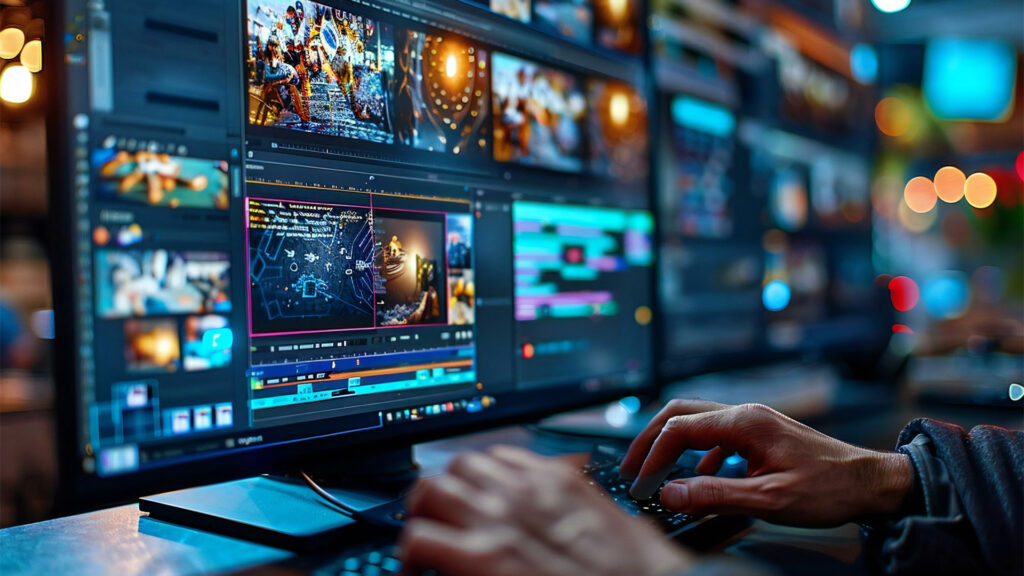Curious about how AI is changing marketing? AI in marketing is transforming everything from customer data analysis to campaign management. In this article, discover 10 significant ways AI is enhancing marketing strategies, offering practical insights and examples.
Key Takeaways
AI is the secret sauce in marketing, turning data into deliciously precise consumer insights for personalized campaigns.
From automating routine tasks to crafting creative content, AI is freeing marketers to focus on strategy and let machines do the heavy lifting.
The future of marketing is looking brighter than a neon billboard, as AI continues to shape roles, boost efficiency, and predict consumer behavior faster than you can say ‘machine learning.’
10 Ways AI Is Transforming Marketing Strategy

Artificial intelligence has completely transformed the marketing landscape by merging technology and creativity, leading to innovative campaign strategies that were previously unimaginable. The role of Chief Marketing Officers (CMOs) is evolving rapidly, requiring them to integrate AI into their strategic frameworks to stay competitive. With the growing demand for AI-skilled marketing professionals in marketing, employers are finding it increasingly challenging to find qualified talent, highlighting the importance of AI knowledge in today’s marketing world.
AI’s ability to analyze vast amounts of data in real time provides insights that inform marketing strategies effectively, allowing for more precise targeting and personalized campaigns. Leveraging deep learning algorithms, AI enhances market research by offering advanced insights into consumer behavior, supporting informed business decisions and identifying emerging trends. Additionally, customer segmentation using AI allows marketers to target specific groups based on detailed behavioral data, resulting in more effective and efficient campaigns.
Generative AI has empowered marketers to produce creative content at an unprecedented scale, streamlining content generation and scheduling. AI tools enhance social media management by automating various tasks, increasing productivity and audience engagement.
Furthermore, AI tools like ClickUp and Asana help manage projects and automate tasks, contributing to overall productivity and allowing marketing teams to focus on strategy and creativity.
Introduction
Artificial intelligence is reshaping marketing, offering businesses unprecedented opportunities. Marketers are increasingly leveraging AI tools to understand consumer behavior and preferences more effectively, promoting enhanced efficiency through automation and analytics. Analyzing vast amounts of data and predicting consumer behavior, AI technologies enhance targeting and personalization, making marketing campaigns more relevant to consumers. The result? Reduced costs and increased productivity for marketing teams.
Real-time data analysis enables AI to help marketers adjust strategies quickly, improving results and campaign effectiveness.
Looking ahead, AI is expected to become even more integrated into marketing strategies, requiring marketers to stay updated on trends and ethical AI usage to enhance consumer trust. With AI’s growing capabilities, the future of marketing looks bright and full of potential.
Understanding AI in Marketing
AI revolutionizes marketing by integrating technology and creativity, resulting in captivating, innovative campaign strategies. The role of Chief Marketing Officers (CMOs) is undergoing a significant transformation, mandating the integration of AI into their strategic frameworks to stay ahead in the competitive marketing arena. With the increasing demand for AI-skilled professionals, the marketing industry is witnessing a shift toward data-driven decision-making and advanced analytics.
AI’s ability to analyze vast amounts of data in real time provides actionable insights, informing marketing strategies and enhancing effectiveness. AI sentiment analysis minimizes human bias, offering consistent results in interpreting consumer feedback and enabling more accurate data-driven decisions. Moreover, AI enhances market research by employing deep learning algorithms to uncover advanced insights into consumer behavior, supporting informed business decisions and identifying emerging market trends.
AI’s ability to perform customer segmentation based on detailed behavioral data allows marketers to target specific groups more effectively, leading to highly personalized and engaging campaigns. Additionally, AI tools streamline social media management by automating content generation, scheduling, and audience engagement, ultimately optimizing marketing efforts.
The advent of generative AI has empowered marketers to produce creative content at an unprecedented scale, revolutionizing content creation and analysis processes.
Enhancing Content Creation with AI

Artificial intelligence is transforming content creation, making it more efficient and effective than ever before. AI tools like StealthGPT help generate human-like text, making content creation more accessible and less time-consuming for marketers. Leveraging AI technology, marketers can produce compelling and original content at scale, ensuring high-quality output that resonates with their audience.
Brandwell, for instance, emphasizes the importance of having final drafts reviewed by humans to maintain quality standards, while StealthGPT offers real-time undetectability scores to assess the originality of AI-generated text.
In the following subsections, we’ll explore AI-powered copywriting tools and visual content generation, showcasing how these technologies enhance content creation.
AI-Powered Copywriting Tools
AI-powered copywriting tools are revolutionizing the way marketers create content. Jasper AI, for example, is renowned for its ability to produce a wide variety of marketing copy, including email campaigns, product descriptions, blog posts, and landing page copy. While Jasper AI’s output may require human intervention to polish the copy, it significantly streamlines the content creation process, saving marketers valuable time.
Headlime specializes in landing page copywriting and offers over 1,700 copy templates to streamline the process, making it easier for marketers to create compelling copy. Additionally, Writer provides features such as autocorrect, autocomplete, grammar checks, clarity checks, and snippets to enhance the writing process, ensuring high-quality and engaging content.
Visual Content Generation
Visual content plays a crucial role in engaging audiences and enhancing online marketing efforts. AI image generator tools like Lexica Art and PhotoRoom automate the editing process, such as background removal, saving time for creators and ensuring visually appealing graphics tailored for social media and blogs. Streamlining image creation and editing, these AI tools increase content production efficiency and effectiveness, allowing marketers to focus on strategy and creativity.
Moreover, AI tools enable the creation of high-quality visual content that captivates and engages audiences, driving consumer engagement and enhancing the overall impact of marketing campaigns. With AI’s ability to generate and edit images quickly, marketers can maintain a consistent and visually appealing online presence, ultimately boosting brand recognition and customer loyalty.
Personalizing Customer Experiences

AI-driven marketing strategies lead to enhanced personalization, tailoring campaigns to specific consumer preferences and improving customer engagement. Analyzing customer data, AI enables marketers to deliver personalized content at scale, enhancing engagement and satisfaction. This level of personalization is achieved through advanced AI technologies that analyze data from multiple interactions, leading to tailored customer experiences that resonate with individual preferences.
Machine learning, for instance, enhances customer segmentation quality by uncovering subtle relationships within data, allowing for more precise targeting and personalized marketing efforts.
In the following subsections, we’ll explore predictive analytics for consumer insights and AI-driven recommendations, highlighting how these technologies contribute to personalized customer experiences.
Predictive Analytics for Consumer Insights
Predictive analytics powered by AI enables marketers to forecast customer behavior and trends, enhancing proactive strategies and improving targeted marketing efforts. AI algorithms significantly enhance the accuracy of predictive analytics, allowing brands to anticipate market trends effectively and optimize ad targeting to improve engagement rates.
Using AI-driven insights can lead to enhanced conversion rates and more effective ad placements, ultimately boosting ROI. Real-time mapping of customer journeys will become possible through AI, aiding marketers in swiftly adapting their strategies to meet changing consumer needs and preferences.
AI-Driven Recommendations
Recommendation engines utilize AI to analyze user data and suggest products or content that align with customer interests, significantly enhancing the user experience. Providing personalized product suggestions based on a shopper’s interactions and preferences, AI systems enhance average order value and improve conversion rates.
AI-driven recommendations continuously learn from shopper interactions, allowing them to refine and adapt product suggestions over time, leading to higher customer satisfaction and loyalty.
The effectiveness of these recommendations can create a personalized shopping journey that fosters long-term customer relationships and drives sales growth.
Optimizing Digital Advertising Campaigns

The implementation of AI in digital marketing is significantly reshaping the industry by enhancing campaign efficiency and effectiveness. AI-driven strategies optimize digital advertising by allowing for real-time adjustments based on performance data, refining audience targeting, and increasing campaign effectiveness.
In the following subsections, we’ll explore how AI automates ad management and enhances ROI, highlighting tools and technologies that contribute to more efficient and effective digital advertising campaigns.
Automating Ad Management
Albert.ai employs machine learning to manage and optimize ad placements effectively, enhancing digital advertising by enabling real-time adjustments based on performance data. This AI-driven approach refines audience targeting, leading to increased campaign effectiveness and better utilization of ad budgets.
AI in digital ads is revolutionizing how companies reach and engage their target audience, providing marketers with the tools to deliver more personalized and impactful ad content. Automating ad management processes, AI reduces the time spent on manual tasks, allowing marketers to focus on strategic objectives and creativity.
Enhancing ROI with AI
AI-driven strategies significantly enhance ROI by allowing marketers to target the right audience more effectively, improving the overall effectiveness of digital advertising campaigns. AI technologies enable better audience targeting and lead to more personalized campaign content, ultimately boosting engagement and conversion rates.
Albert.ai uses machine learning to analyze data and make real-time adjustments to ad campaigns, resulting in more efficient ad spending and higher ROI.
Additionally, social media monitoring can uncover new influencer partnerships that may benefit marketing campaigns, further enhancing the impact and reach of digital advertising efforts.
Streamlining Social Media Marketing
AI tools significantly enhance productivity in creating social media content by automating repetitive tasks, allowing marketers to focus on strategy and creativity. By streamlining content generation, scheduling, and audience engagement, AI tools optimize social media marketing efforts and improve overall campaign effectiveness.
In the following subsections, we’ll explore social media monitoring tools and AI chatbots for engagement, highlighting how these technologies streamline social media marketing and enhance consumer engagement.
Social Media Monitoring Tools
Brand24 is a powerful tool for monitoring online mentions and sentiment about brands, providing valuable insights into public perception and consumer behavior. By performing sentiment analysis, Brand24 helps marketers understand how their brand is perceived, allowing them to make informed decisions and adjust their strategies accordingly. Notable clients like Uber, Stanford University, and Intel have successfully leveraged Brand24’s capabilities to enhance their social media monitoring efforts.
With the ability to track mentions and analyze sentiment in real-time, Brand24 allows marketers to stay ahead of potential issues and capitalize on positive trends. This proactive approach to social media monitoring ensures that brands can maintain a strong online presence and engage with their audience effectively.
AI Chatbots for Engagement
AI chatbots are crucial for driving two-way conversations and improving customer service on social media platforms. Chatfuel, an official partner with Meta (formerly Facebook), allows users to create custom chatbots easily using a drag-and-drop interface. These chatbots can interpret misspelled or non-grammatical responses, ensuring a smooth and natural conversation flow.
Userbot.ai manages conversations by learning from previous interactions and adding new inquiries over time, enhancing the chatbot’s ability to serve customers effectively. Automating responses and handling routine inquiries, AI chatbots reduce the workload on human staff, improving response times and customer satisfaction.
Improving SEO with AI
AI tools like Surfer SEO significantly enhance content optimization strategies by providing detailed analysis and actionable insights. These tools help improve content ranking in real-time by evaluating various on-page factors and suggesting necessary adjustments. By leveraging AI’s capabilities, digital marketers can ensure their content remains competitive and visible on search engines.
In the following subsections, we’ll explore real-time SEO analysis and keyword research, highlighting how AI-driven tools enhance these critical aspects of SEO.
Real-Time SEO Analysis
AI provides immediate feedback on SEO strategies, allowing marketers to adjust content in real-time for better performance. AI-driven SEO tools offer instant feedback on website performance, identifying both strengths and areas for improvement, which enhances responsiveness and ultimately leads to improved website performance.
With real-time performance metrics, marketers can make data-driven decisions quickly, ensuring their SEO strategies remain effective and aligned with search engine algorithms.
Keyword Research and Implementation
AI-driven keyword research simplifies the process of finding relevant keywords that boost content visibility. Tools like Surfer SEO provide actionable insights with top-ranking keywords, helping marketers by offering a content outline and image density recommendations. Brandwell is also used for generating SEO blog posts, facilitating the seamless integration of keywords into the writing process.
Effective keyword research and implementation are crucial for maximizing search engine rankings and enhancing user engagement, ensuring that content reaches and resonates with the target audience.
Automating Routine Marketing Tasks
AI improves marketing efficiency by automating repetitive tasks, allowing teams to focus on strategy and creativity. By streamlining processes such as content optimization and keyword analysis, AI tools significantly enhance content optimization strategies and search engine rankings.
In the following subsections, we’ll explore workflow automation tools and virtual assistants, highlighting how these technologies contribute to organizational efficiency and productivity.
Workflow Automation Tools
Zapier is a popular tool for automating tasks and integrating marketing processes, offering over 3,000 integrations across various marketing platforms. By automating ad management processes and reducing the time marketers spend on manual tasks, AI allows marketing teams to focus on strategic objectives and creative initiatives.
AI-driven workflow automation tools like Zapier enhance organizational efficiency, enabling marketers to streamline repetitive tasks and concentrate on high-impact activities.
Virtual Assistants in Marketing
AI-driven virtual assistants are revolutionizing customer interactions by automating responses and handling routine inquiries efficiently. These AI assistants lead to improved response times and enhanced customer satisfaction, significantly reducing the workload on human staff.
Managing customer interactions and providing timely responses, AI-powered virtual assistants improve the overall customer experience, allowing marketers to focus on more strategic tasks.
Leveraging AI for Market Research
AI technologies are transforming market research by enabling marketers to derive deep consumer research insights and make data-driven decisions effectively. Predictive analytics and sentiment analysis tools enhance the analysis of consumer data, providing real-time insights that inform campaign strategies and identify new trends.
In the following subsections, we’ll explore web scraping for competitive intelligence and sentiment analysis tools, highlighting how these AI technologies contribute to market research and strategy development.
Web Scraping for Competitive Intelligence
Browse AI facilitates competitive intelligence through data scraping, training bots to scrape data automatically and simplifying the data collection process. By mimicking human behavior, Browse AI overcomes bot protection measures like Captcha, ensuring smooth data scraping and gathering significant market data.
AI-powered web scraping tools like Browse AI enhance competitive intelligence strategies, providing marketers with valuable insights into their competitors’ activities and market trends.
Sentiment Analysis Tools
Sentiment analysis is a crucial aspect of understanding consumer behavior and public perception. AI tools use natural language processing techniques to analyze text data from various sources, identifying positive, negative, or neutral sentiments. Implementing AI sentiment analysis tools helps brands make informed decisions, tailor marketing strategies, and enhance customer engagement.
Processing large amounts of unstructured data, AI sentiment analysis tools offer valuable insights into consumer feelings, enabling swift and effective responses to market changes.
Enhancing User Experience with AI
AI technologies are reshaping user interactions and improving the overall user experience on digital platforms. Behavioral analytics platforms track user behavior and interactions, providing actionable insights that enhance user experience and drive customer engagement.
In the following subsections, we’ll explore behavioral analytics platforms and customized search solutions, highlighting how these AI technologies optimize user experiences and foster long-term customer relationships.
Behavioral Analytics Platforms
Behavioral analytics platforms like Fullstory help marketers understand user journeys by tracking how users interact with digital products. These platforms record user sessions, allowing businesses to see exactly how users navigate their sites and apps, identify bottlenecks in user flows, and make targeted improvements to site design.
The insights derived from behavioral analytics facilitate UX improvements, making digital interactions more intuitive for users and enhancing overall satisfaction.
Customized Search Solutions
AI-powered search technologies like Algolia offer fast, relevant search and recommendation capabilities, significantly improving the efficiency of searches on websites. Providing personalized and meaningful engagements, these solutions help users find what they need quickly, boosting satisfaction and driving conversions.
Effective recommendations provided by AI not only enhance user satisfaction but also foster long-term customer relationships, contributing to the overall success of marketing campaigns.
The Future of AI in Marketing

The integration of AI in marketing is reshaping job roles and skill requirements in the industry, with AI technologies anticipated to play a significant role in marketing job functions by 2028. While AI poses threats to traditional marketing roles by automating tasks, it also enhances creativity and strategic decision-making, offering new opportunities for marketers.
By 2030, the AI market in digital marketing is expected to exceed $1.5 trillion, highlighting its growing importance and the potential for further innovation. Generative AI tools have revolutionized the marketing landscape, allowing for innovative engagement methods and high-quality content creation.
As AI technologies continue to evolve, future systems are expected to produce highly realistic content, improving the quality of ai marketing materials and driving more effective campaigns.
Summary
In summary, AI is transforming the marketing landscape by offering unprecedented opportunities for innovation, efficiency, and personalization. From enhancing content creation and personalizing customer experiences to optimizing digital advertising campaigns and improving SEO, AI technologies are revolutionizing how marketers approach their strategies and engage with their audiences. By leveraging AI tools and techniques, marketing professionals can stay ahead of the competition and deliver more impactful campaigns that resonate with their target audience.
As AI continues to evolve, its integration into marketing strategies will become even more critical, requiring marketers to stay updated on trends and best practices. Embracing AI’s potential will not only enhance marketing efforts but also drive long-term success and growth. The future of marketing is bright, and AI is at the forefront of this exciting transformation.
Frequently Asked Questions
How is AI transforming content creation in marketing?
AI is the new creative sidekick, whipping up human-like text and snazzy images while giving instant feedback—perfect for marketers who want to keep things fresh without breaking a sweat. So, embrace the bots and watch your content soar!
What role does AI play in personalizing customer experiences?
AI is like your friendly neighborhood mind-reader, analyzing customer data to whip up personalized experiences that hit the mark. With its predictive powers, it ensures that marketers are always one step ahead, crafting campaigns that make customers feel like the star of the show!
How does AI optimize digital advertising campaigns?
AI is like the savvy assistant you never knew you needed—automating ad management and fine-tuning audience targeting in real-time to maximize your ROI. With tools like Albert.ai on your side, you can spend less time worrying and more time celebrating your campaign successes!
What are the benefits of using AI-driven social media monitoring tools?
Using AI-driven social media monitoring tools gives you the superpower to track online buzz and gauge public sentiment, helping you dodge PR disasters and ride the wave of positive trends. Embrace the tech, and watch your marketing game soar!
How can AI improve SEO strategies?
AI can boost your SEO game by giving you instant feedback on how your site is performing and making keyword research feel like a leisurely stroll in the park. With tools like Surfer SEO, you can optimize your content and watch your visibility soar—no magic wand required!
